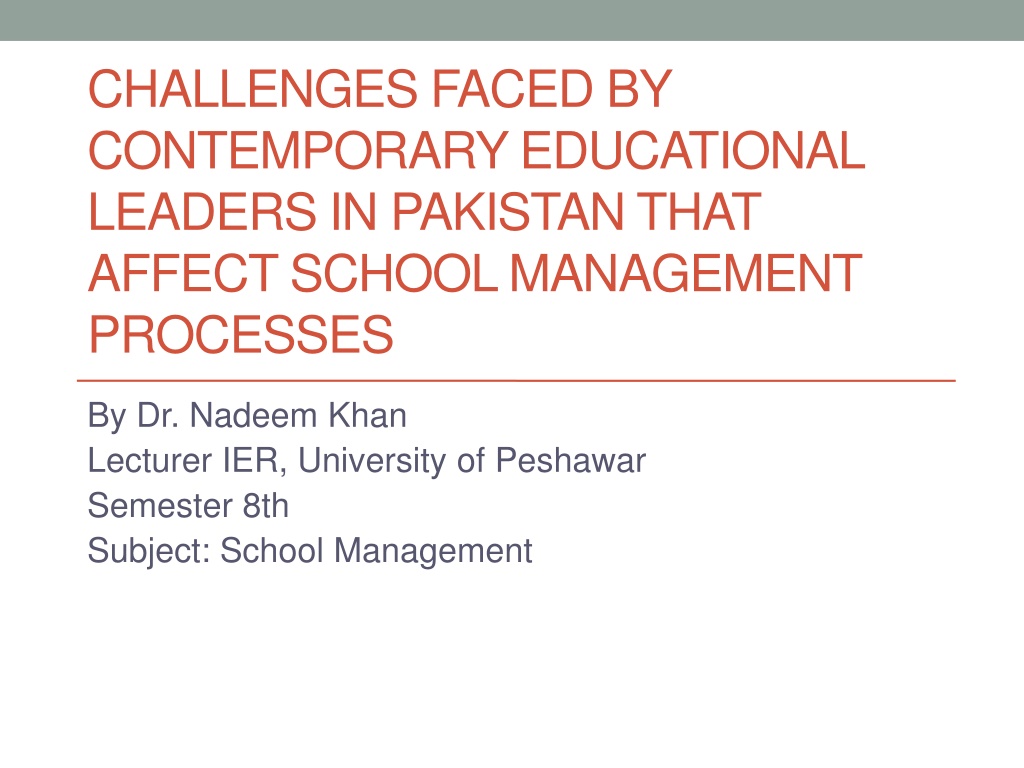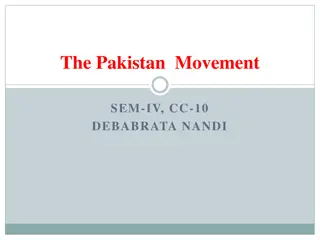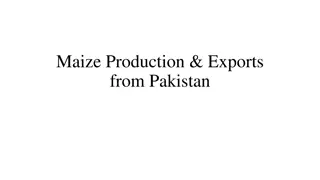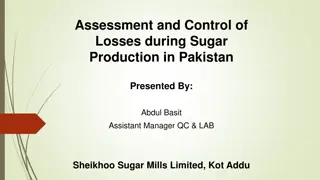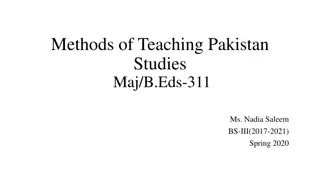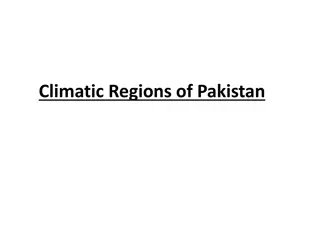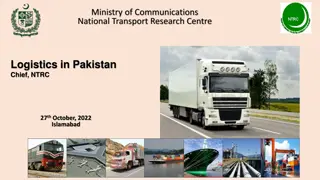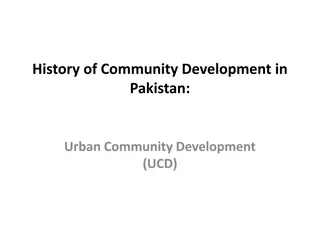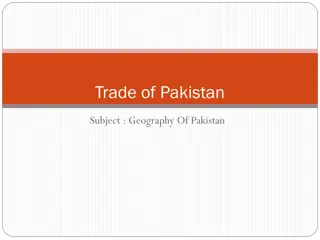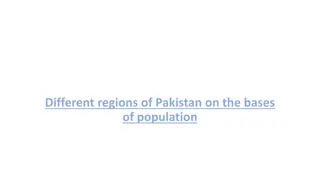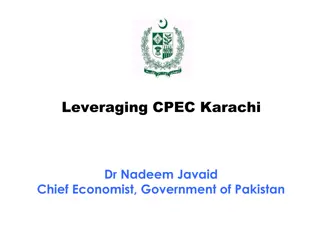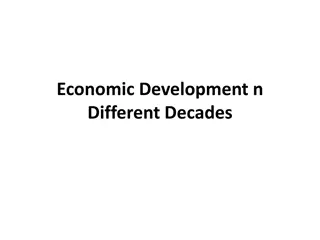Challenges Faced by Educational Leaders in Pakistan
Educational leaders in Pakistan face challenges in school management processes, including lack of clarity in roles, inadequate training opportunities, and the need for effective leadership skills. Addressing these challenges is crucial for improving the education system.
Download Presentation

Please find below an Image/Link to download the presentation.
The content on the website is provided AS IS for your information and personal use only. It may not be sold, licensed, or shared on other websites without obtaining consent from the author.If you encounter any issues during the download, it is possible that the publisher has removed the file from their server.
You are allowed to download the files provided on this website for personal or commercial use, subject to the condition that they are used lawfully. All files are the property of their respective owners.
The content on the website is provided AS IS for your information and personal use only. It may not be sold, licensed, or shared on other websites without obtaining consent from the author.
E N D
Presentation Transcript
CHALLENGES FACED BY CONTEMPORARY EDUCATIONAL LEADERS IN PAKISTAN THAT AFFECT SCHOOL MANAGEMENT PROCESSES By Dr. Nadeem Khan Lecturer IER, University of Peshawar Semester 8th Subject: School Management
Literature describes three levels of management- strategic, organizational and operational. Strategic level involves translation of vision into broad aims and long term plans; organizational level facilitates conversion of strategic thinking into medium term objectives supported by allocation of appropriate resources and effective strategies such as delegation of power, shared decision making; and operational level ensures that resources are utilized, and tasks are coordinated, monitored and completed. When managers get mastery over strategic matters they tend to begin performing themselves as leaders.
A typical school head teacher is engaged in three types of tasks- academic, administrative, and financial. My personal experiences of working with head teachers reveals that majority of head teachers do not have any document indicating their tasks and how to perform them effectively. This adds non-clarity of head teachers' role, which has affected head teachers' performance
Despite their heavy administrative work there are few head teachers who still provide academic leadership in their schools and considered to be 'effective heads'. However, few effective Head teachers will not deal with the present complexity of school system until the centrality of education leadership for the success of school systems is recognized.
Head teachers do not seem to have tapped their potentials for creating their future. Hence, it is essential that they should participate in professional development programmes for sharpening their skills and competence. In this regard, the public and private sectors have initiated professional development programmes for school leadership for developing effective management and leadership skills and competence. This will help them to make their schools as 'learning' or 'leadful' schools, which are engaged in expanding their capacity by using generative learning.
Holmes (1997) has rightly suggested that 'Today's educational leaders must not only possess the knowledge and skills to meet these challenges but also have the courage, integrity and imagination to find innovative ways to deal with these challenges. Thus, head teachers must go through a major paradigm shift for broadening their vision and mental models. In order to change head teachers ' 'personal' and professional' vision, they require life-learning approach for becoming 'perpetual learners'
(Barth, 1997). Thus leadership requires learning habits and attitudes. Looking at head teachers' task, it appears that head teachers seem to be overloaded with routine tasks which have created dependency culture. In order to come out of dependency culture, head teachers as leaders need to become perpetual learners. School leaders must learn about new leadership and management practices by rediscovering the passion and moral purpose that makes schools as 'learning schools'.
Despite their participation m such professional development programmes, majority of head teachers still tend to work as 'managers' rather than 'leaders'. They tend to face numerous challenges that include: imbalanced role of head teachers, lack of clarity and understanding of roles, lack of leadership qualities, lack of effective professional development programmes, lack of professional autonomy, interference of political leaders in school matters, dependency and boss culture, head teachers' recruitment on seniority rather than merit basis, lack of understanding about schools as 'learning schools', and overly use of 'top-down' management model. These challenges have become major 'stumbling blocks' to affect effective leadership at school level.
Keeping in mind governance and the complexities of school management dynamics, government needs an explicit policy on head teachers' recruitment, promotion and professional development. Traditional ways of managing schools have not been useful; head teachers need to explore alternate ways of managing schools within the government policy framework.
I tend to agree with Fullan (1997) that 'We need to move away from the notion of how the principal [head teachers] can become lead implementer of multiple policies and programmes. What is needed is to reframe the question. What does a reasonable leader do, faced with impossible tasks' (p.7). It is my conviction that the schools of 21st century can only be managed by 'pedagogical leaders' who are able to create enabling environment how to learn together so that they are able to create more commitment, passion, competence, confidence, and creativity to handle messiness of complex phenomenon of school as a 'learning schools'.
By just adopting these ideas without careful thinking, implementation is bound to fail. No 'silver bullet' will help head teachers to manage their own schools effectively but school leaders must learn from their and others' experiences and shape their own role to make their impossible tasks possible. This will allow head teachers to make their schools as 'effective' and 'learning schools'.
Pakistan is considered a developing country financial matters have badly affected the pace of socio-economic development. Since the independence, educational financing has been insufficient. Lack of financial aid to school has impacted the smooth functioning of the schools in terms of administrative and management, monitoring, supervision and teaching learning. This situation has placed the county in the list of the countries who have the lowest literacy ratio in the world instead of similar socio-economic status (Memon, 2007).
Pakistan is considered a developing country financial matters have badly affected the pace of socio-economic development. Since the independence, educational financing has been insufficient. Lack of financial aid to school has impacted the smooth functioning of the schools in terms of administrative and management, monitoring, supervision and teaching learning. This situation has placed the county in the list of the countries who have the lowest literacy ratio in the world instead of similar socio-economic status (Memon, 2007).
Time and again the Academy of Educational Planning and Management, has recommended more funding to the educational sector to improve the facilities and quality of teaching (Academy of Educational Planning and Management, [AEPAM, 2002]. However, the lack of financial funds has been pointed out by research, Ahmad (2006) concluded that the same findings that at least 4% GNP must be spent on Education sector.
He further observed that financial allocations for education are shifted to other sectors. Bajarani, (2003) also observed the same thing that educational budget cannot be increased due to other financial constraints and shifting to other heads such as terrorism. The low achievement level of education sector is due to financial low allocation. It has been 2% of GNP at present and in the past before 1984-85, but recently increased to 2.5%. Apart from it, higher education has always been a priority of the governments. This is because of presence of upper class people in the policy making institutions.
However, the literature cited indicates that educational sector at every level of education deal with major financial restrictions including secondary education. This consequently influences the performance of the education sector in general and school level in particular. This situation needs that it should be increased at least 4% GNP, as suggested by UNESCO.
Head teacher in a school setting is a leader. All the resources of the school, whether man or material are placed at his disposal and are to be effectively managed by him/her. According to Dessler, (1998), As a leader, school head requires certain policies and practices to manage the human aspects of the administration including, training, and appraising nature of task, identifying the required staff and assigning tem duties accordingly, picking the right person for right job, training the new staff, timely provision of remuneration , wages, salary, and rewards, appreciating performance, negotiating with employees, professional development, and instill recruiting, screening,
Teacher competency level in secondary school of Pakistan is very essential. Professional development of the staff is a core responsibility of a Head Teacher/Headmistress (Davey, 1991). This purpose can be achieved by a head who knows his followers very well and the art of motivation and recognizing the capacity of the learners identify his creative powers. Without professional competency, he/she cannot achieve his/her targets within school setting. National Education Policy has emphasized for making teaching profession attractive and fascinating through offering a package of incentives (NEP, 1998-2010).
Community is a main stakeholder in secondary school context in Pakistan. Its effective participation increases the efficiency of school and maximizes the level of productivity of both staff and learners. School exists for social aims, therefore, the participation of the community in school activities is very essential which can be a challenge for the head teacher. Its participation is extremely important in performing /smooth running of the managerial responsibilities by the head teacher
